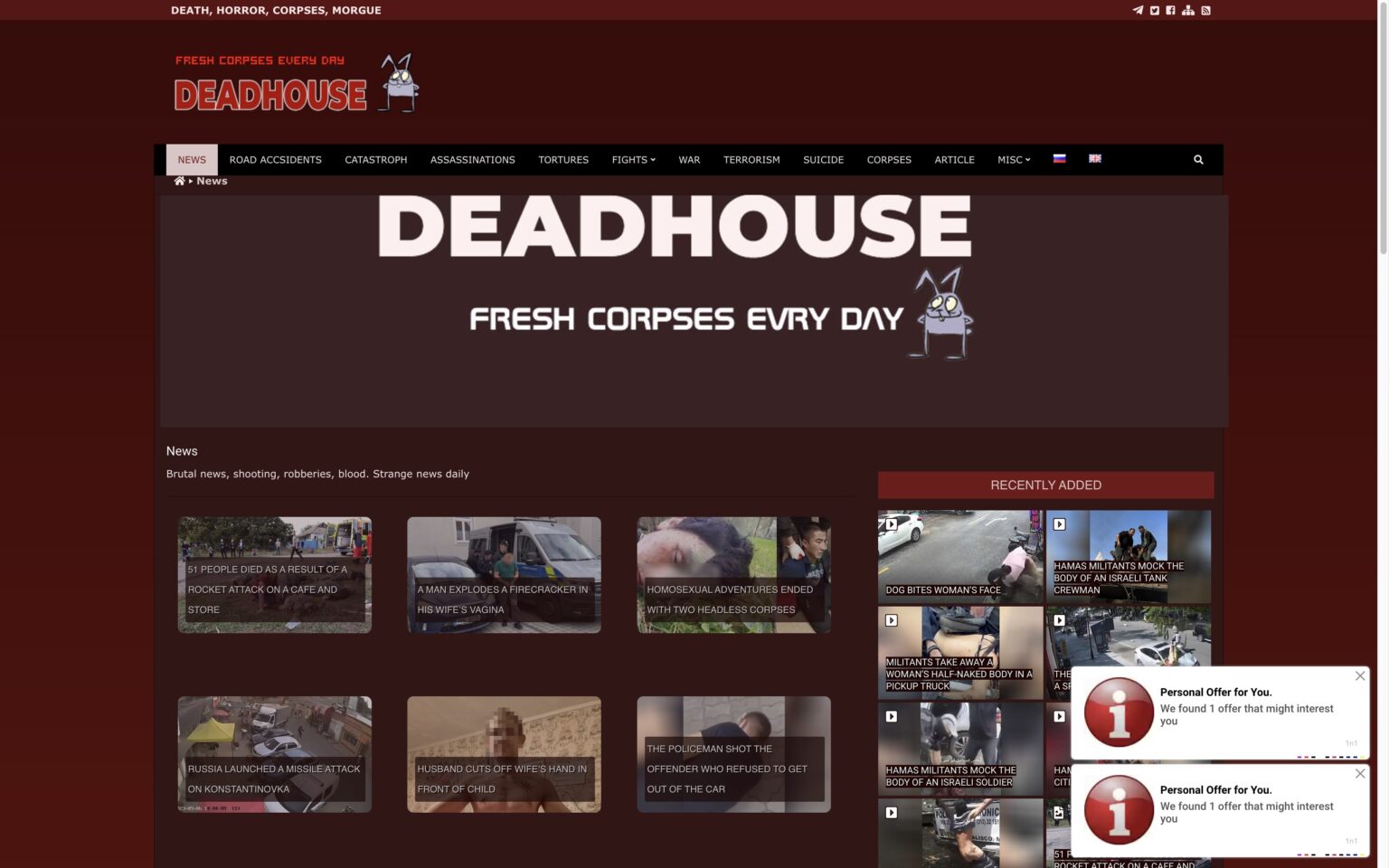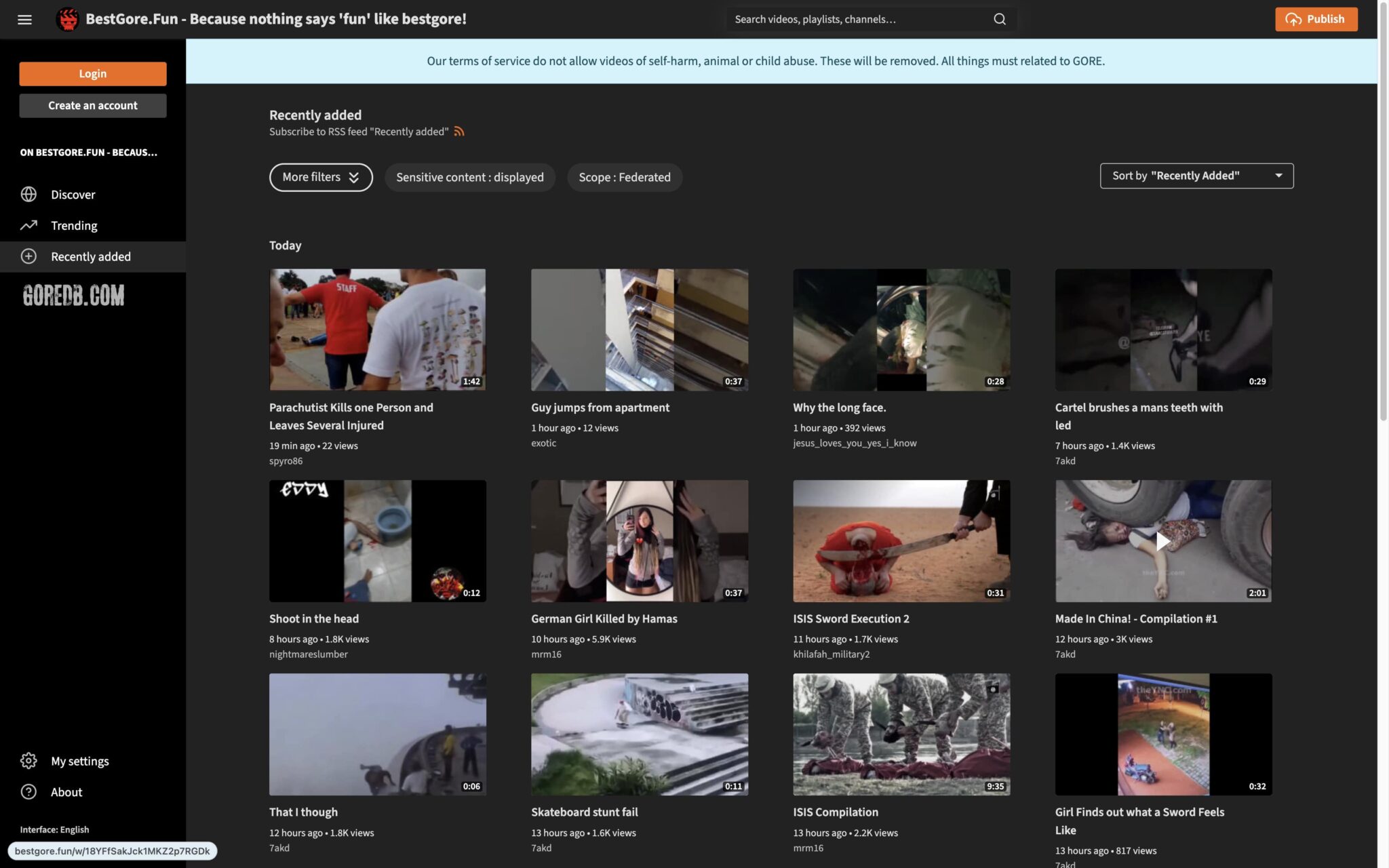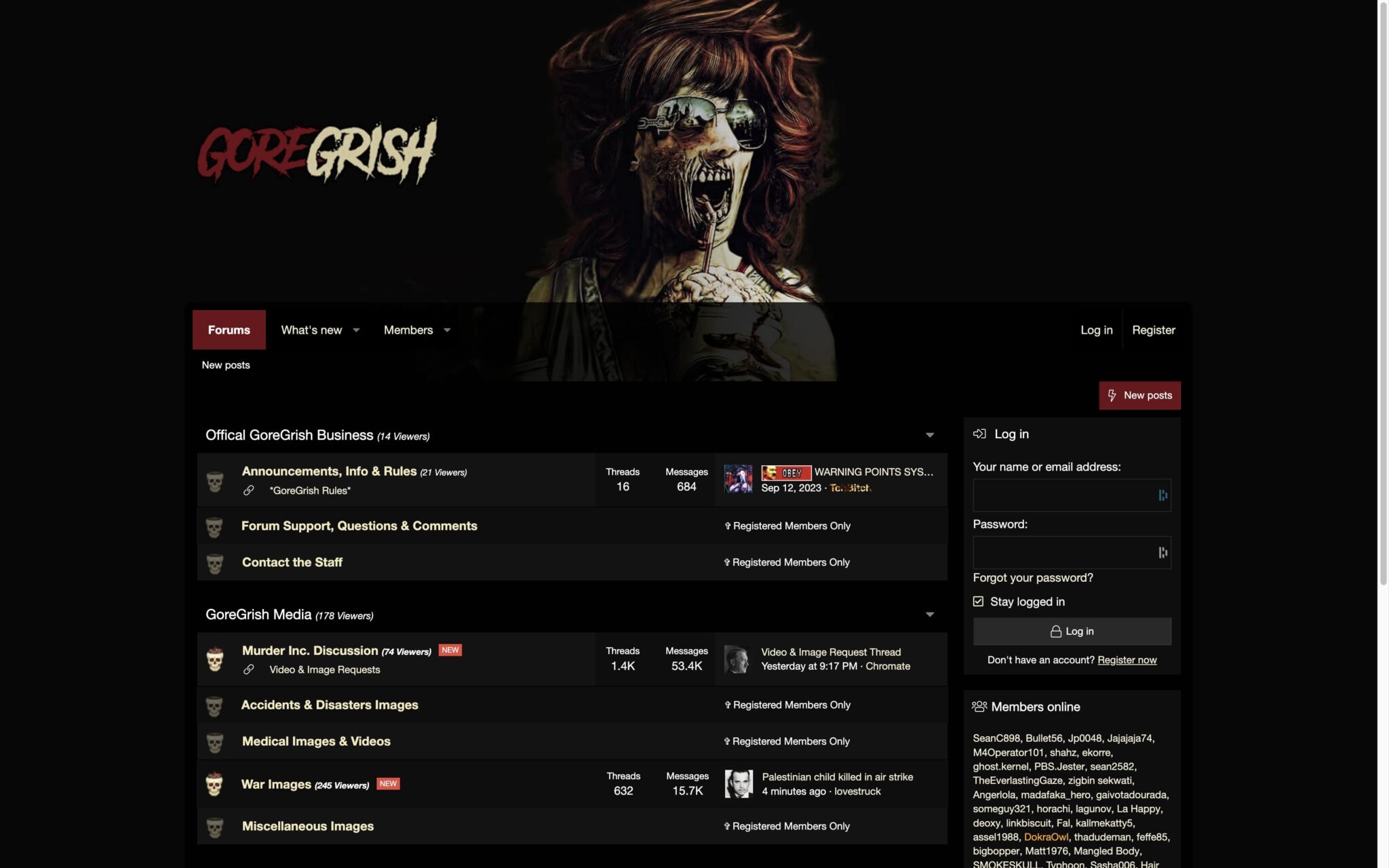Finding Safe Bestgore Alternatives: Navigating Extreme Content Online
The internet, in its vastness, offers an unparalleled array of information and experiences. For many, this includes a curiosity about the darker, unfiltered corners of the web, leading some to seek out sites like Bestgore.com. This platform, once a notorious hub for extreme content, has since ceased operations, leaving a void for those interested in its particular brand of unfiltered reality. Consequently, the search for a "bestgore alternative" has become a common query, prompting a critical discussion about the nature of such content, the motivations behind seeking it, and, most importantly, the ethical and legal implications involved.
This article aims to provide a comprehensive guide for individuals navigating this complex landscape. While the allure of uncovering unfiltered content, satiating curiosity, might be strong, it's crucial to approach this area with extreme caution. Our focus will be on understanding the context of Bestgore's closure, exploring the motivations for seeking such content, and, most critically, emphasizing the importance of responsible, legal, and ethical engagement with extreme or graphic material. We will delve into why seeking bestgore alternatives requires a nuanced understanding of digital safety, legality, and personal well-being.
Table of Contents
- The Legacy of Bestgore and Its Closure
- Why the Curiosity? Exploring the Draw of Extreme Content
- The Inherent Dangers of Unregulated Shock Sites
- Defining a Responsible Bestgore Alternative
- Ethical Considerations and Digital Responsibility
- The Legal Landscape of Accessing Extreme Content
- Responsible Content Consumption: A Guide
- The Psychological Impact of Graphic Material
The Legacy of Bestgore and Its Closure
Bestgore.com was, for many years, a controversial and widely discussed website known for hosting graphic and often disturbing content, including real-life gore and violence. Its existence sparked numerous debates about censorship, freedom of speech, and the psychological impact of such material. For a period, it served as a destination for those who wished to explore the darker side of the web, offering a platform where users could encounter unfiltered content.
However, the era of Bestgore.com came to an end. On November 17, 2020, a significant development occurred that signaled its permanent closure. When asked in the comment section on Bestgore.com's LBRY.tv site whether Bestgore.com was down and if it would be indefinitely, Mark Marek, the site's founder, replied, "most likely permanently." This statement confirmed what many had suspected: the site was no longer operational and was unlikely to return. This event marked a turning point, pushing those who previously frequented the site to search for a "bestgore alternative." News outlets, such as Globalnews.ca, frequently covered Bestgore.com videos and related news articles, highlighting the site's notoriety and the public interest surrounding its content and eventual shutdown.
Why the Curiosity? Exploring the Draw of Extreme Content
The human psyche is complex, and curiosity is a powerful driver. For some, the allure of extreme content, including the category's list of screamers and shock sites which contain gore and violence, stems from a primal fascination with the macabre, a desire to understand the boundaries of human experience, or even a morbid curiosity about real-world events that are typically sanitized by mainstream media. Sites like Bestgore allowed individuals to uncover unfiltered content, satiating this particular curiosity.
This interest isn't necessarily indicative of malicious intent. It can be driven by a range of factors:
- A Search for Unfiltered Reality: In an age where much of what we consume is curated and often sanitized, some individuals seek out content that presents reality in its rawest form, believing it offers a more authentic perspective.
- Psychological Exploration: For others, it might be an attempt to confront fear, test personal boundaries, or understand human suffering and resilience from a detached perspective.
- Morbid Fascination: A universal aspect of human nature is a certain morbid curiosity about death, disaster, and violence. Extreme content platforms tap into this inherent interest.
- Desensitization or Thrill-Seeking: In some cases, prolonged exposure to various forms of media might lead to desensitization, prompting a search for increasingly graphic material to elicit a reaction or a sense of thrill.
The Inherent Dangers of Unregulated Shock Sites
While the curiosity to explore the darker side of the web is understandable, the dangers associated with unregulated shock sites and platforms that host extreme content are profound and far-reaching. These risks extend beyond the graphic nature of the content itself, encompassing legal, ethical, and digital security concerns. Seeking a bestgore alternative without a clear understanding of these risks can inadvertently lead to significant problems.
Legal and Ethical Pitfalls
One of the most critical aspects of seeking bestgore alternatives is ensuring that you access extreme content without inadvertently supporting illegal activities or unethical practices. Many unregulated sites operate outside the bounds of the law, often hosting content that is illegally obtained, depicts non-consensual acts, or is linked to criminal enterprises. Engaging with such sites can have serious consequences:
- Support for Illegal Activities: By visiting or interacting with these sites, users may unknowingly contribute to their traffic and revenue, thereby indirectly supporting the individuals or groups involved in creating or distributing illegal content. This can include content related to human trafficking, child exploitation, or other severe crimes.
- Ethical Compromises: The content on many shock sites often exploits victims of violence or tragedy. Viewing such material can be deeply unethical, as it commodifies human suffering and disregards the dignity and privacy of those depicted. Legal platforms prioritize user safety and ethical considerations, which is a stark contrast to the modus operandi of many unregulated sites.
- Potential for Legal Repercussions: Depending on the jurisdiction and the specific content accessed, viewing or downloading certain types of extreme material can carry severe legal penalties. Laws regarding obscenity, child exploitation, and incitement to violence vary globally, and ignorance is rarely an excuse.
Digital Security Risks
Beyond the content itself, unregulated sites pose significant threats to your digital security. These platforms often lack robust security measures, making them fertile ground for malicious actors:
- Malware and Viruses: Many shock sites are riddled with malware, viruses, ransomware, and spyware. A single click on a malicious link or even just visiting the site can infect your device, leading to data theft, system damage, or loss of personal information.
- Phishing and Scams: These sites are often used as fronts for phishing attempts, where users are tricked into revealing sensitive information like login credentials or financial details. Pop-ups and deceptive advertisements are common tactics.
- Privacy Breaches: Unregulated sites rarely adhere to privacy standards. Your IP address, browsing habits, and other personal data can be easily collected and sold to third parties, or used for targeted malicious attacks.
- Exposure to Unwanted Content: Even if you are seeking a specific type of extreme content, unregulated sites often expose users to a broader range of disturbing or illegal material without warning, which can be deeply traumatizing or lead to further legal risks.
Defining a Responsible Bestgore Alternative
Given the severe risks associated with unregulated shock sites, the concept of a "responsible bestgore alternative" shifts significantly from merely finding another source of graphic content. Instead, it focuses on avenues that allow for the exploration of human experience, violence, or tragedy within ethical, legal, and safe frameworks. A responsible alternative prioritizes:
- Legality: The platform and its content must comply with all local and international laws. This means no illegal depictions, no non-consensual content, and no incitement to violence.
- Ethical Sourcing: Content should be obtained and presented ethically, respecting the dignity of individuals involved and avoiding exploitation. This often means content is presented in a journalistic, educational, or artistic context, rather than for pure shock value.
- User Safety: The platform must be digitally secure, free from malware, and committed to protecting user privacy.
- Context and Education: Responsible platforms often provide context, analysis, or educational information alongside graphic material, helping viewers understand the broader implications rather than just consuming raw imagery.
- Control and Choice: Users should have control over what they view, with clear warnings and options to avoid disturbing content if desired.
Ethical Considerations and Digital Responsibility
When discussing extreme content and the search for a "bestgore alternative," ethical considerations are paramount. Digital responsibility extends beyond mere legality; it encompasses the moral implications of our online actions and consumption habits. Every piece of content, especially graphic material, has a story behind it, often involving real individuals and real suffering.
- Victim Dignity: A core ethical principle is respect for victim dignity. Much of the content on unregulated shock sites is obtained without consent from victims or their families, turning their tragedy into public spectacle. Responsible content consumption means refusing to participate in this exploitation.
- The Impact of Sharing: Sharing or promoting graphic content, even if legally permissible in some contexts, can re-victimize individuals, spread trauma, and normalize violence. Digital responsibility calls for careful consideration of the broader societal impact of our online activities.
- Moral Complicity: By actively seeking out and consuming content from illegal or unethical sources, one can be seen as morally complicit in the practices that generate such content. This includes inadvertently supporting criminal networks or the exploitation of vulnerable individuals.
- The Dehumanization Effect: Constant exposure to extreme violence can lead to desensitization and the dehumanization of others. This can erode empathy and alter one's perception of real-world suffering.
The Legal Landscape of Accessing Extreme Content
The legal ramifications of accessing, possessing, or distributing extreme content, particularly that which falls into the category of gore and violence, vary significantly across jurisdictions. It is critical for anyone seeking a bestgore alternative to understand these legal nuances, as ignorance of the law is rarely a defense. Legal platforms prioritize user safety and adherence to national and international statutes.
- Jurisdictional Differences: What might be legal in one country could be highly illegal in another. For example, content depicting extreme violence or certain sexual acts might be protected under free speech in some nations, while being strictly prohibited and punishable by severe penalties in others.
- Child Exploitation Material (CSAM): This is a universal red line. Any content depicting child abuse is illegal globally, and possession or distribution carries extremely harsh penalties, often involving lengthy prison sentences. Unregulated sites are notorious for hosting such material, sometimes without clear labeling, putting unwitting users at risk.
- Incitement to Violence and Hate Speech: Content that incites violence, promotes terrorism, or constitutes hate speech is illegal in many countries. Platforms that host such material, and individuals who knowingly access or share it, can face legal action.
- Non-Consensual Content: Videos or images depicting violence or sexual acts without the explicit consent of all parties involved are illegal in most places. This includes "revenge porn" and other forms of digital abuse.
- Copyright and Piracy: Even seemingly innocuous content can be illegal if it violates copyright laws. While less severe than other offenses, accessing pirated material from unregulated sites still carries legal risks.
Responsible Content Consumption: A Guide
For those genuinely curious about the realities of violence, human resilience, or the darker aspects of society, there are responsible and ethical ways to explore these themes without resorting to illegal or exploitative "bestgore alternative" sites. The key lies in choosing legitimate avenues that prioritize journalistic integrity, educational value, and ethical considerations.
Exploring Legitimate Avenues
Instead of unregulated shock sites, consider these legitimate sources for understanding complex or difficult realities:
- Investigative Journalism and Documentaries: Reputable news organizations and documentary filmmakers often cover difficult subjects, including violence and its aftermath, with sensitivity, context, and a focus on factual reporting. Sources like Globalnews.ca provide legitimate news coverage, including articles related to events once discussed on sites like Bestgore.com, but presented within a journalistic framework. Documentaries on platforms like Netflix, HBO, or independent film festivals delve deep into true crime, historical events, and social issues, often including interviews with victims, experts, and law enforcement, providing invaluable context.
- Academic and Research Papers: Universities and research institutions publish studies on violence, trauma, criminology, and psychology. These peer-reviewed resources offer analytical perspectives, data, and insights without the sensationalism.
- Museums and Historical Archives: Many museums (e.g., Holocaust museums, war museums) and historical archives present difficult historical realities through curated exhibits and collections, often with educational programs and support resources.
- True Crime Podcasts and Books: While entertainment-focused, many true crime narratives, when produced responsibly, offer detailed accounts of crimes and their impact, often with a focus on justice and victim advocacy, rather than gratuitous gore.
- Medical and Forensic Resources: For those interested in the scientific aspects of injuries or death, legitimate medical journals, forensic science documentaries, or educational resources for professionals provide accurate information without the exploitative nature of shock sites.
Protecting Your Digital and Mental Well-being
Regardless of where you choose to seek content, protecting your digital and mental well-being is paramount:
- Use a VPN: A Virtual Private Network (VPN) encrypts your internet connection and masks your IP address, enhancing your online privacy and security, especially when navigating less reputable corners of the web (though it does not grant immunity from legal consequences for illegal activities).
- Maintain Antivirus Software: Keep your antivirus and anti-malware software updated and run regular scans to protect against malicious threats.
- Be Wary of Links and Downloads: Never click on suspicious links or download files from unknown sources, especially on sites that seem questionable.
- Practice Digital Hygiene: Use strong, unique passwords, enable two-factor authentication, and regularly back up your data.
- Monitor Your Mental Health: Exposure to graphic content can have significant psychological impacts, including anxiety, PTSD, and desensitization. If you find yourself distressed, seek support from mental health professionals. Resources like the National Suicide Prevention Lifeline or local mental health services can provide help.
- Set Boundaries: Understand your personal limits regarding graphic content. It's okay to disengage if something becomes too disturbing or affects your well-being.
The Psychological Impact of Graphic Material
Beyond the legal and ethical considerations, it's crucial to acknowledge the profound psychological impact that prolonged or intense exposure to graphic material, such as that found on sites like Bestgore, can have. The human brain is not designed to constantly process extreme violence and trauma without consequence.
- Desensitization: Repeated exposure can lead to desensitization, where the emotional response to violence diminishes. This can manifest as reduced empathy, a distorted perception of reality, and an increased tolerance for aggression.
- Anxiety and PTSD Symptoms: Viewing traumatic content can trigger symptoms akin to Post-Traumatic Stress Disorder (PTSD), including intrusive thoughts, nightmares, hypervigilance, and avoidance behaviors. Even indirect exposure can be traumatizing.
- Distorted Worldview: A constant diet of extreme content can lead to a cynical or paranoid worldview, where the world is perceived as inherently dangerous and violent, impacting trust in others and overall well-being.
- Emotional Distress: Acute emotional distress, including fear, disgust, sadness, and anger, is a common immediate reaction to graphic material. For some, these feelings can linger and become debilitating.
- Normalization of Violence: For younger or impressionable individuals, exposure to unfiltered violence can normalize aggressive behavior, making it seem more acceptable or common than it is in reality.
- Compulsive Viewing: In some cases, the search for increasingly graphic content can become a compulsive behavior, similar to addiction, where individuals feel a compulsion to seek out more extreme material despite negative consequences.
In conclusion, the search for a "bestgore alternative" is more than just a quest for another source of extreme content; it's an opportunity to reflect on digital responsibility, ethical consumption, and personal well-being. While sites like Bestgore once allowed users to explore the darker side of the web and uncover unfiltered content, their closure and the inherent dangers of such platforms highlight the critical need for caution. Seeking bestgore alternatives ensures that you access extreme content without inadvertently supporting illegal activities or unethical practices. Legal platforms prioritize user safety and ethical considerations, offering a stark contrast to the unregulated corners of the internet.
We've explored the motivations behind this curiosity, the significant legal and digital security risks associated with unregulated shock sites, and the profound psychological impacts of graphic material. Instead of seeking direct replacements for Bestgore, we advocate for responsible content consumption through legitimate channels like investigative journalism, academic resources, and documentaries, which provide context and ethical frameworks. Your digital and mental well-being should always be the priority. We encourage you to share your thoughts on responsible content consumption in the comments below or share this article with others who might benefit from this crucial discussion. Explore our other articles for more insights on navigating the complexities of the digital world safely and ethically.

Sites Like BestGore: Exploring Alternative Platforms

Sites Like BestGore: Exploring Alternative Platforms

Sites Like BestGore: Exploring Alternative Platforms